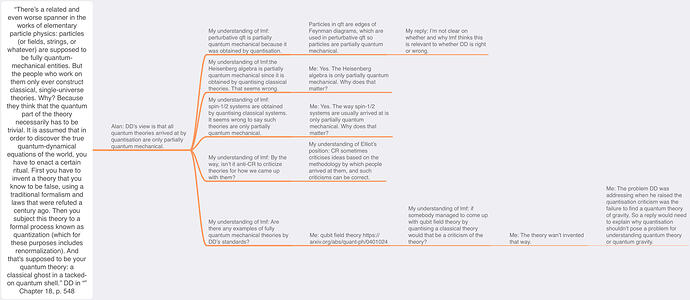Okay. Thanks for making the tree. You and I had very different understandings of what the discussion tree looked like. I saw the top 4 branches as being finished threads, which is why I didn’t think it was a complicated discussion. I will go branch by branch (top to bottom) and explain.
My reply: I’m not clear on whether and why lmf thinks this is relevant to whether DD is right or wrong
I thought this branch of the discussion was finished, but I was going back through the conversation in an effort to explain why to you, and I realized that I misinterpreted something that DD said.
There’s a related and even worse spanner in the works of elementary particle physics: particles (or fields, strings, or whatever) are supposed to be fully quantum-mechanical entities.
I think DD and I have different views of what particles actually are. For DD, particles are supposed to be fully quantum mechanical, and so it is a problem for him that they aren’t this way in QFT. From my perspective, particles are almost definitionally not fully quantum mechanical: I guess I think the ‘fundamental’ entities of physics are fields and spacetime, not particles.
This explains why, on my view, me explaining that particles in QFT are only partially quantum mechanical was a refutation of DD’s claim that particles should be fully quantum mechanical. For me, particles basically are particles in QFT, so they are not fully quantum mechanical. At the time, I thought DD made a mistake that I have seen other physicists make, the mistake of not realizing that Feynman diagrams are an inherently quasi-classical thing.
Anyway, I don’t know if this disagreement about what particles are is relevant to whether DD is right or wrong, but it might be worth digging into it later. I think we should resolve the definitional issue before we move onto this, though.
Me: Yes. The Heisenberg algebra is only partially quantum mechanical. Why does that matter?
This branch is finished, because it doesn’t matter (to you). It did matter to me at the time, because I was trying to get a clearer understanding of what you actually meant by partially quantum mechanical. My initial guess was that a definition of partially quantum mechanical should not include the Heisenberg algebra, so you must have a mistaken definition, but I was wrong.
Me: Yes. The way spin-1/2 systems are usually arrived at is only partially quantum mechanical. Why does that matter?
This branch is finished, because it was also a thing that mattered to me at the time but shouldn’t matter to you. Just like the above branch where you talk about the Heisenberg algebra, my purpose in talking about the spin-1/2 system was to get a better grasp on your definition. My initial guess was that a definition of partially quantum mechanical should not include the spin 1/2 system, so you must have a mistaken definition, but I was wrong.
My understanding of Elliot’s position: CR sometimes criticisms ideas based on the methodology by which people arrived at them, and such criticisms can be correct.
This branch is finished, because I also agree that Elliot’s blog post shows why my original criticism (of it being anti-CR to criticize theories for how we came up with them) is insufficient.
I consider the bottom branch unresolved.
Let me approach this by criticizing the root of the tree (my bold):
Alan: DD’s view is that all quantum theories arrived at by quantisation are only partially quantum mechanical.
I assume that “arrived at” here actually means “have been arrived at,” rather than “could be arrived at.”
The latter interpretation wouldn’t make sense, because
Am I right?
edit: oops, I didn’t include the criticism that I implied I would include above. I won’t include it yet because I want to better understand what you mean first.
By the way, a third possibility for what you might mean also just occurred to me. I noticed that you said (my bold)
Me: Yes. The way spin-1/2 systems are usually arrived at is only partially quantum mechanical. Why does that matter?
In the root of the tree, do you maybe mean that DD’s view is that all quantum theories which are usually arrived at by quantisation are only partially quantum mechanical?
